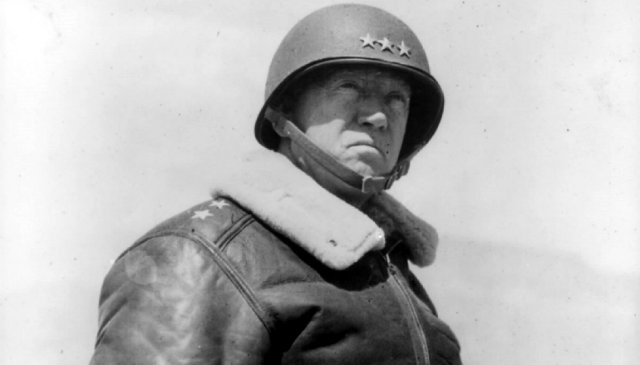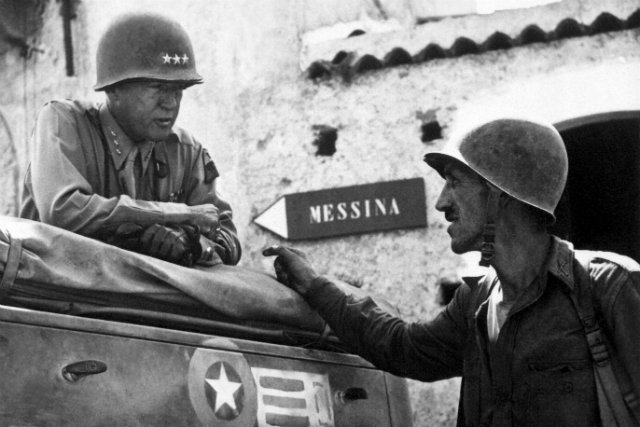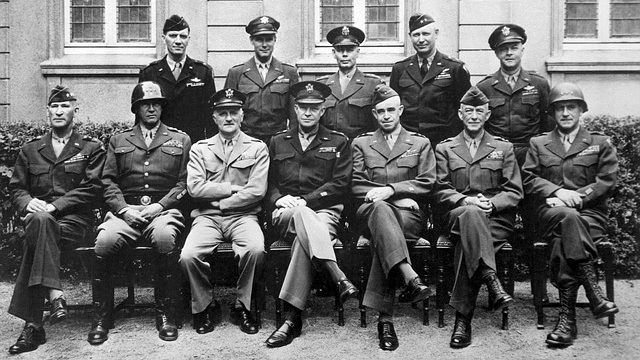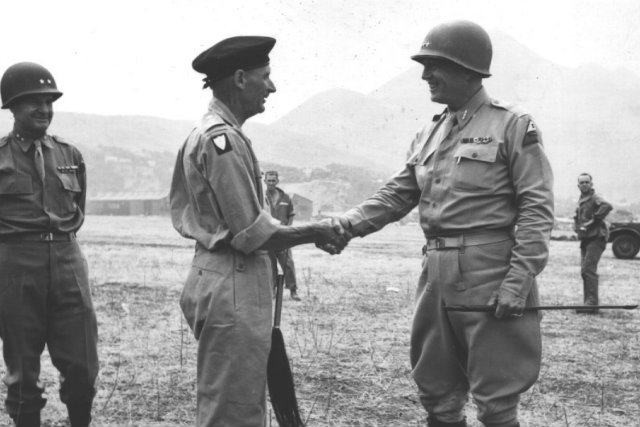General George S. Patton was every bit the colorful character depicted in this video clip. The 1970 film Patton portrayed him as an aggressive, insubordinate egoist, whose main goal was to get to Berlin first and personally shoot Adolf Hitler. So how could this crusty warrior help today’s business leaders become better leaders and improve their business?
While the movie showed Patton as a controversial and sometimes insubordinate commanding general — which he was — Patton had an unrelenting leadership and management style and philosophy. In fact, many of Patton’s principles were similar in content — if not necessarily in style — to those of the famous self-improvement guru Dale Carnegie. For example, Carnegie said, “Develop success from failures. Discouragement and failure are two of the surest stepping stones to success.” Patton’s take was, “Success is how high you bounce on the bottom.”

One of Patton’s staff officers, Porter B. Williamson, articulated Patton’s management principles in his book Patton’s Principles—A Handbook for Managers who Mean It!. Williamson’s anecdote-rich biography describes Patton as a commander with an uncompromising set of principles. Those principles ranged from the gung-ho (“Grab [the enemy] by the nose and kick ‘em in the pants”) to the quaint (“Keep your feet clean and study the Bible”).
In between those extremes are what could be called Patton’s principles for good managers:
1. Say what you mean and mean what you say.
Have you met managers whose directions leave so much wiggle room that when failure occurs, there is no one to blame? When General Patton gave an order he typically adopted his “war face” and usually included a profanity or two. The war face was his acknowledgement that battle was a life-or-death business. The profanity was his desire to speak in the language of the common soldier, whose chances of surviving battle depended on following the plan.
Nowadays managers can benefit from Patton’s advice. The manager’s “war face” is how they communicate their seriousness and dedication to the goal or task at hand. Managers don’t need to profanity to speak the language of their subordinates. They need to be competent and earn the confidence that comes from experience and accomplishments.
2. Always be alert to the source of trouble.
Have you communicated your organization’s mission and sought to find out if it has permeated the company culture? Patton was constantly making sure his soldiers understood the mission. He was an early advocate of “management by walking around.” He knew the value of leaving the desk and getting out to see what the troops were doing.
In wartime, trouble can come from any direction, and that direction could include from within the organization. The modern manager likewise has to be alert to unexpected sources of trouble. A supplier’s excuse for late delivery, a breakdown of efficiency in the warehouse operation, a rising level of employee absences, or sloppy security at computer terminals are all precursors of trouble that can lead to disaster. Good managers keep their antennae on the swivel.
 3. Leaders must have the authority to match their responsibility.
3. Leaders must have the authority to match their responsibility.
They say success has many parents, but failure is an orphan. Sometimes a project fails because the individual — or group — did not have sufficient authority over those who could help it succeed. Patton would tell his subordinates, “If you run into any problem, tell them I sent you. You are acting for me. I will back you up all the way. Right or wrong. I will back you up! But you better be right!”
A corollary to that principle was Patton’s advice never to send a child to do an adult’s job. Designate a qualified person, and give that person all the authority necessary to do the job. Patton required total loyalty from his subordinates, who knew he would back them up even if they made a mistake. That same backup resulted in every team-member’s fervent effort to always be right.
4. Never fight a battle when nothing is gained by winning.
We often see unproductive turf wars, feuds, and grudges in organizations. Patton marveled at the number of battles fought in war and in civilian life “and nothing is gained by the victory.” He applied that principle in war with battle plans designed to actually gain advantage.
How many fights could we avoid if we refused to fight unless we gained something as a result? Perhaps we get into fights for the fun of fighting and to prove the other person wrong. But for Patton, war was not fun. “We are not going to fight any battles for fun,” Patton insisted.
 5. An active mind cannot exist in an inactive body.
5. An active mind cannot exist in an inactive body.
Look around and watch employees who work through lunchtime or never leave their workstations. Are they more productive than those who take periodic breaks or leave for a noontime exercise break? Who are the most productive and energetic?
Patton saw the correlation between a fit body and a creative mind. The will to win, according to Patton, never gets into the brain without first having a strong body. Patton had a colorful description of the process: “You have to keep the body active to keep all the juices running to the right places.” So, Patton never stopped stressing physical fitness. He demanded every soldier under his command run a mile every day.
The author of Patton’s Principles recalled that most of his staff duties chained him to a standard civilian desk and chair. Frequently Patton would stop at the author’s desk and ask, “How long have you been sitting at that damn desk? … Your brain stops working after you sit in a swivel chair for twenty minutes. If you sit there too long all of the brain power will be in your shoes…”
6. There is no power in a bushel of blubber.
Patton usually elicited laughter from his troops when he would lecture:
“A man who cannot see his shoes without bending halfway to the ground has a real problem! He is spending all his energy driving around a bushel of blubber! Power comes from the engine in the belly… Great piece of machinery, that belly. Put in good food and you get good power back out. If you keep the belly muscles tight you can increase the power of the whole body…The food you eat turns into power just like gasoline in a car. Your belly should be strong and tight enough to take a dozen saber wounds and never stop going forward.”
If you have nagging concerns about your own “bushel,” remember that becoming stronger and fitter will provide you with more energy and strength to apply to your work. Think about Patton’s advice.
7. To gain strength always go beyond exhaustion.
Anyone doing an exhausting or frustrating task has experienced the urge to give up and abandon the project as a lost cause. Of course, the best cure is to take a break and return to the task.
In the case of a deadline, however, Patton’s advice to exhausted warriors is valid for the modern worker, whether the task is physical or mental. It is all about endurance. Patton’s advice: “You got to drive the body to the last inch of energy and then go on. You gain nothing by just going up to where you are exhausted. The body will only build and grow fit the demands which the mind makes.”
Patton figured that if all we do is exercise until the body is tired, “the body will get lazy and stop a bit shorter every time.” You need to go beyond the point of exhaustion and go on from there. “That way the body will figure out, ‘We got to build up more body strength if that crazy mind is going to drive this hard.’”
Patton knew that once you let the body tell the mind when to quit, “you are whipped for sure.” According to Patton, “We lazy humans only use about half of our total body strength; less than that of our brains. We rust out because we are too lazy to get up a good hot sweat.”
The Modern Application of Patton’s Principles
So, unlike Dale Carnegie, General Patton never tried to win friends. However Patton’s principles of command and management directly influenced people: the thousands of soldiers under his command, many of whom returned to their families because he never sent them into battle unprepared.







